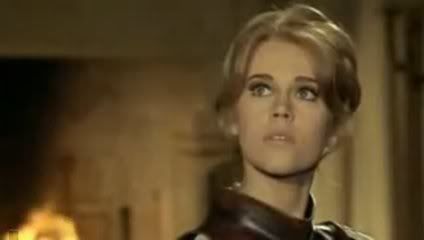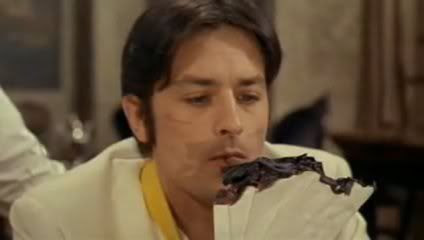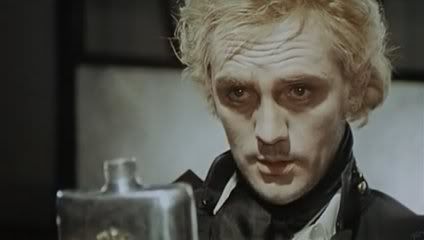Horror and fatality have been stalking abroad in all ages.
For my second Poe film of the month (can you guess what January's Kryptic Army Mission is?) I chose 1968's Spirits of the Dead, an anthology collecting three of Poe's macabre tales adapted by three of Europe's most celebrated directors. (Well, at least two of them were.) The one that gets all the plaudits nowadays is Federico Fellini's "Toby Dammit," which has the least to do with the story it's ostensibly based on, but there are two other segments to get through before we come to it.

First up is Roger Vadim's take on "Metzengerstein," which he tackled right after completing Barbarella with his then-wife Jane Fonda, who also stars in this and gets to appear in a parade of outlandish and revealing outfits because that's pretty much what Vadim knows how to do. Fonda plays a cruelly decadent libertine of a countess who becomes enamored of her estranged cousin (who's played by her brother Peter for maximum incest-related creepiness) and doesn't take it well when he snubs her. Once scorned she has his stables set on fire (because she's vindictive like that) and is pained to learn that he perished in the blaze. No wonder she's convinced that a riderless black stallion that appears right afterward is both the incarnation of the horse in a tapestry on her wall and the reincarnation of her dead cousin. This leads to a lot of scenes of Fonda both on and off the horse, frequently in outlandish and revealing outfits. Like I said, that's pretty much what Vadim knows how to do.

The second tale has a bit more going for it since it's Louis Malle's adaptation of "William Wilson," which stars Alain Delon as the title character, who's introduced running into a church and buttonholing a priest so he can confess to a murder. Turns out he's quite the notorious fellow, having been a troublemaker at boarding school and medical school before landing in the Austrian Army. Along the way, though, he's been dogged by his double, whose m.o. appears to be showing up at inopportune moments and spoiling his rotten schemes. These include torturing a fellow student, terrorizing a helpless young woman and cheating at cards to get back at a haughty socialite (played very haughtily by Brigitte Bardot). After being exposed by his double once too often Wilson does away with his shadow self, but that only winds up spelling his own doom.

And speaking of characters who are pretty much doomed right from the start, that's the perfect description for Terence Stamp in "Toby Dammit," which Fellini based (very loosely) on the story "Never Bet the Devil Your Head." Brought to Rome to make "the first Catholic Western" (which the director describes as "something between Dreyer and Pasolini with just a hint of John Ford"), Toby is bombarded by a parade of Fellini's grotesques and thrown into a bewildering television interview and self-congratulatory awards show, all of which he endures with a pained expression on his face and a steady supply of booze. Turns out all he really wants is the Ferrari he was promised in his contract and when that's delivered he immediately gets behind the wheel and drives around Rome like a maniac. That's the sort of thing only Roberto Benigni can do safely, though, so it should come as no surprise that Toby winds up losing his head over the whole deal. (And, no, that's not a spoiler, Dammit.)
So, in the final tally I have to agree with the critical consensus that "Toby Dammit" is the best of the lot, but I'm glad I hung in there with the other two segments. Sure, "Metzengerstein" is overlong (you have to really like watching Jane Fonda ride around on a horse to appreciate its middle section) and "William Wilson" could have used a bit more pep, but at least Vadim and Malle can lay claim to being faithful to their source material. That's got to count for something, right?

First up is Roger Vadim's take on "Metzengerstein," which he tackled right after completing Barbarella with his then-wife Jane Fonda, who also stars in this and gets to appear in a parade of outlandish and revealing outfits because that's pretty much what Vadim knows how to do. Fonda plays a cruelly decadent libertine of a countess who becomes enamored of her estranged cousin (who's played by her brother Peter for maximum incest-related creepiness) and doesn't take it well when he snubs her. Once scorned she has his stables set on fire (because she's vindictive like that) and is pained to learn that he perished in the blaze. No wonder she's convinced that a riderless black stallion that appears right afterward is both the incarnation of the horse in a tapestry on her wall and the reincarnation of her dead cousin. This leads to a lot of scenes of Fonda both on and off the horse, frequently in outlandish and revealing outfits. Like I said, that's pretty much what Vadim knows how to do.

The second tale has a bit more going for it since it's Louis Malle's adaptation of "William Wilson," which stars Alain Delon as the title character, who's introduced running into a church and buttonholing a priest so he can confess to a murder. Turns out he's quite the notorious fellow, having been a troublemaker at boarding school and medical school before landing in the Austrian Army. Along the way, though, he's been dogged by his double, whose m.o. appears to be showing up at inopportune moments and spoiling his rotten schemes. These include torturing a fellow student, terrorizing a helpless young woman and cheating at cards to get back at a haughty socialite (played very haughtily by Brigitte Bardot). After being exposed by his double once too often Wilson does away with his shadow self, but that only winds up spelling his own doom.

And speaking of characters who are pretty much doomed right from the start, that's the perfect description for Terence Stamp in "Toby Dammit," which Fellini based (very loosely) on the story "Never Bet the Devil Your Head." Brought to Rome to make "the first Catholic Western" (which the director describes as "something between Dreyer and Pasolini with just a hint of John Ford"), Toby is bombarded by a parade of Fellini's grotesques and thrown into a bewildering television interview and self-congratulatory awards show, all of which he endures with a pained expression on his face and a steady supply of booze. Turns out all he really wants is the Ferrari he was promised in his contract and when that's delivered he immediately gets behind the wheel and drives around Rome like a maniac. That's the sort of thing only Roberto Benigni can do safely, though, so it should come as no surprise that Toby winds up losing his head over the whole deal. (And, no, that's not a spoiler, Dammit.)
So, in the final tally I have to agree with the critical consensus that "Toby Dammit" is the best of the lot, but I'm glad I hung in there with the other two segments. Sure, "Metzengerstein" is overlong (you have to really like watching Jane Fonda ride around on a horse to appreciate its middle section) and "William Wilson" could have used a bit more pep, but at least Vadim and Malle can lay claim to being faithful to their source material. That's got to count for something, right?